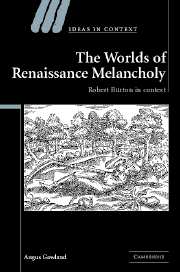Book contents
1 - The medical theory of melancholy
Published online by Cambridge University Press: 13 January 2010
Summary
It is evident from even the most cursory browse through The Anatomy of Melancholy that much of Burton's labour in writing involved investigating and assessing the ever-increasing mass of medical works that had established the disease as one of the most serious forms of mental affliction of the era. Insofar as part of his aim was to divulge learning in a manner that would be of practical benefit to his readership, it is imperative to view the Anatomy as an encyclopaedic compendium of classical, medieval, and early modern medical knowledge about melancholy, and in this respect the book was an unrivalled success. However, whilst the Anatomy offers a vantage-point from which the contours of medical knowledge can be viewed, we should avoid the presumption that Burton provides us with a straightforward vision of this field in the early seventeenth century. His purpose was not to compile other authors' opinions disinterestedly, but to present them in a fashion that furthered moral and spiritual goals. Admittedly, in many respects he had no desire to depart from contemporary medical orthodoxy. But what was the role of his exhaustive exploration of the medical teachings about melancholy in his larger humanist project?
Here I shall investigate the way in which the Anatomy presented the resources of the continental neo-Galenic medical community as a pragmatic intellectual-therapeutic response to the author's perception that melancholy had reached epidemic proportions in his society.
- Type
- Chapter
- Information
- The Worlds of Renaissance MelancholyRobert Burton in Context, pp. 33 - 97Publisher: Cambridge University PressPrint publication year: 2006



